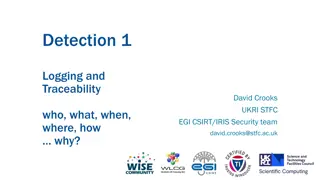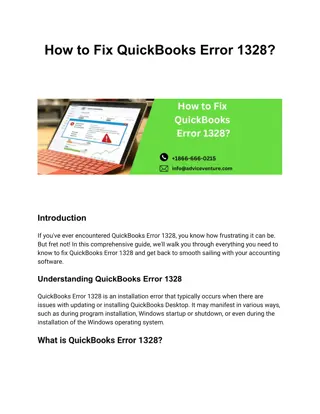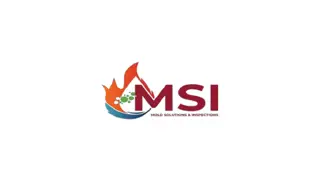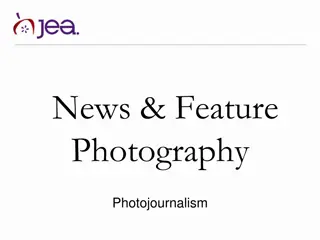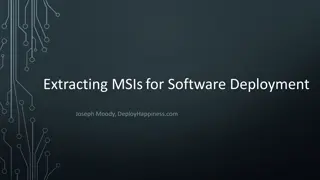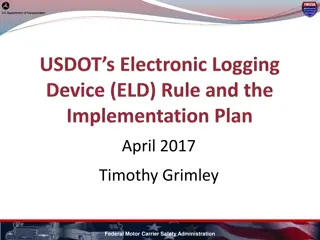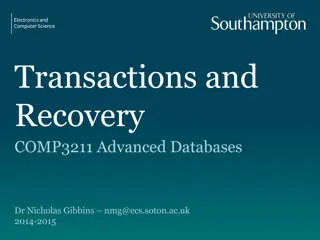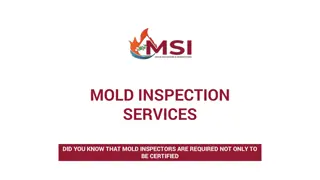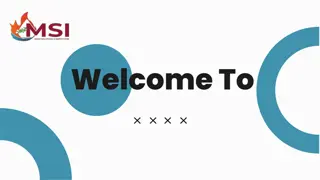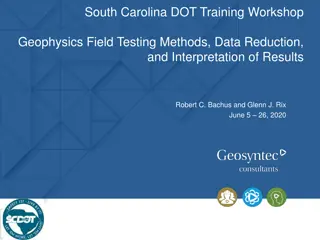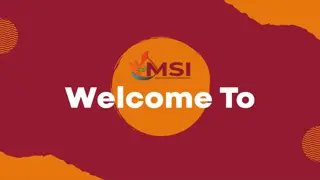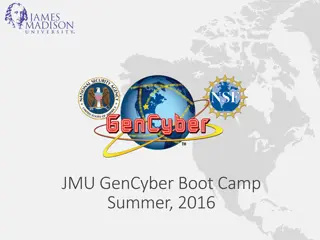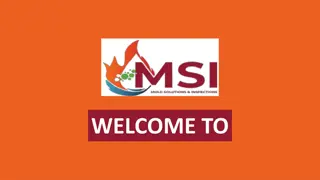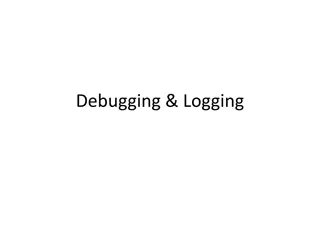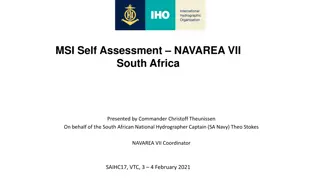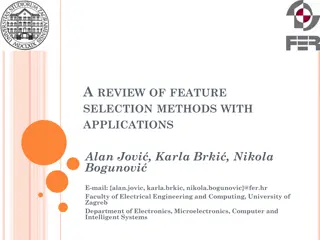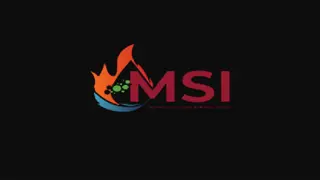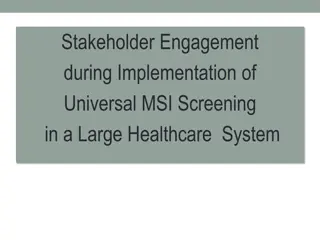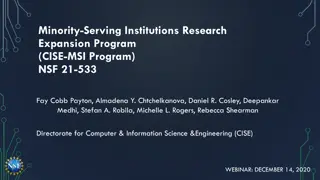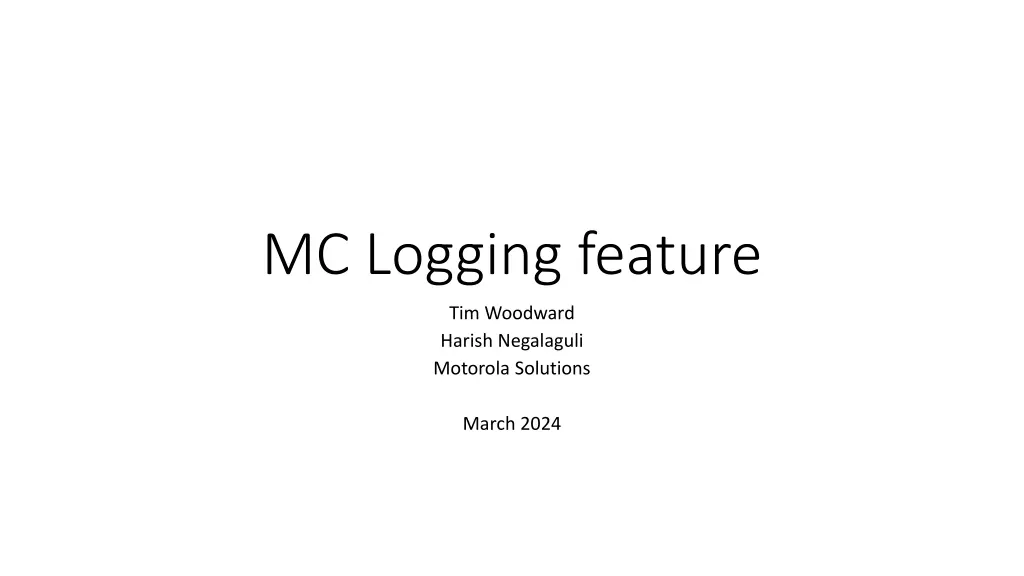
MC Logging Functional Features and Architecture Details
"Explore the comprehensive functional features and primary architecture components of MC Logging, including interactions with servers, storage, and authorized users. Learn about logging events, target user configurations, and logging processes for individual and group calls."
Download Presentation

Please find below an Image/Link to download the presentation.
The content on the website is provided AS IS for your information and personal use only. It may not be sold, licensed, or shared on other websites without obtaining consent from the author. If you encounter any issues during the download, it is possible that the publisher has removed the file from their server.
You are allowed to download the files provided on this website for personal or commercial use, subject to the condition that they are used lawfully. All files are the property of their respective owners.
The content on the website is provided AS IS for your information and personal use only. It may not be sold, licensed, or shared on other websites without obtaining consent from the author.
E N D
Presentation Transcript
MC Logging feature Tim Woodward Harish Negalaguli Motorola Solutions March 2024
Primary Architecture components MC Logging function Interacts with MC Servers (MCPTT, MCData, MCVideo) Will need to also interact with CMS Interacts with MC Logging Storage Interacts with authorized logging client MC Logging Replay function Interacts with KMS and GMS Interacts with MC Logging Storage Interacts with authorized logging replay client MC Logging Storage Stores Logged events Protects Logged events Interacts with Logging function for storage of logged events Interacts with Logging Replay function for retrieval of logged events MC Logging/Replay Authorized user Manages target users and groups Controls replay
MC Logging Functional Model MC Service server(s) (Home servers for individuals and groups) MC Logging function MC Logging client CMS Authorized MC Logging/Replay User(s) MC Logging storage IdMS MC Logging Replay client KMS MC Logging Replay function GMS(s)
Types of logging events 1. Individual call logging when target is an individual user. 2. Group call logging when the target is an individual user. 3. Group call logging when the target is a group. 4. Other logging events (e.g. Emergency Alerts, Affiliation, etc.) For each logging event, there are 3 services that may be logged; MCPTT, MCVideo and/or MCData. NOTE: It s highly probable that agencies will want to log EVERY call all of the time.
Logging when target is an individual Logging when target is an individual 1. MC Logging function obtains the MC Service ID(s) of the target user and interested service (MCPTT, MCVideo and/or MCData) to be logged. a. List of users can be configured into CMS by system admin for use by an authorized logging manager. MC Logging function goes to the CMS and retrieves the user profile(s) for the target user for each service (MCPTT, MCVideo & MCData). a. In other words, the MC Logging function must ask the CMS for up to 3 user profiles for the target user using the same or different MC Service ID(s) used for each service. b. Each MCPTT, MCVideo and MCData user profile contains the address of the target s Home MC Server for that service, plus all the groups that the target user is a member of for that service, plus the Home server address for each of those groups. From information in the user profile, the MC Logging function; a. Individually notifies each Home MC Service server of the target user for each service to be logged (i.e. MCPTT, MCVideo, MCData) and requests logging for that target user. b. Individually notifies EVERY home server of each group that the target user is a member of, and requests Logging of group calls for that target user. 2. 3.
Individual target/Individual call Individual target/Individual call 4. When the Home MC Service server of the target user sees an individual call setup request with the target user as either the initiator or target of the call, the MC Service server forwards all related signaling and media to the MC Logging function for the duration of the call. The MC Logging function receives the signaling and media, verifies it is allowed to log the target, then tags and pushes the signaling and media to the MC Logging Storage. The transfer of the signaling and media should be protected between the MC Service server and the MC Logging function and between the MC Logging function and the MC Logging storage. DEFINING THIS IS THE RESPONSIBILTY OF SA3 NOTE: We need to carefully consider how to handle logging during Migration, especially if the target user gets a different MC Service ID in the partner MC System. What about aliases? 5. 6. 7. 8.
Individual target/group call Individual target/group call 4. When the Home server of the group sees a group call setup request where the target user is an AFFILIATED member and has joined the call*, the MC Service server forwards all related signaling and media to the MC Logging function. * Should the call be logged if the individual user is unavailable or rejects the call? Initial thought is no, however, how do we know if the target user is actually participating in a group call? The MC Logging function receives the group signaling and media, verifies it is allowed to log the individual and group, tags it, then pushes the signaling and media to the MC Logging Storage. The transfer of the signaling and media should be protected between the Home server of the group and the MC Logging function, and between the MC Logging function and the MC Logging storage. DEFINING THIS IS THE RESPONSIBILTY OF SA3 What is actually forwarded to the MC Logger needs careful consideration. Initial thinking is we only need to log the media and signaling of the floor- granted talker, not the outbound media and signaling to every participant. 5. 6. 7.
L Logging when target is a group ogging when target is a group 1. MC Logging function obtains the Group ID of the group (MCPTT, MCVideo and/or MCData) to be logged. a. List of group IDs and Home server addresses can be configured into CMS by system admin for use by an authorized logging manager. 2. The MC Logging function notifies the Home Server of the group and requests logging of group calls for the target group.
Group target/Group call Group target/Group call 3. When the Home Server of the group sees a group call setup request for the target group, the Home Server forwards all related signaling and media to the MC Logging function. The Home Server need only send the inbound/outbound signaling and inbound media from the floor-granted talker? 4. The MC Logging function receives the group signaling and media, verifies it is allowed to log the group, then tags and pushes the signaling and media to the MC Logging Storage. 5. The transfer of the signaling and media should be protected between the Home group server and the MC Logging function, and between the MC Logging function and the MC Logging storage. DEFINING THIS IS THE RESPONSIBILTY OF SA3
Stuff the MC logging function should keep track of MC Logging function should have an end date/time or a duration of logging parameter to stop logging a particular target or group. Maybe the maximum is keep logging until authorized user says stop? MC Logging function should verify when receiving signaling and media that the MC Logging function is allowed to log at least one of the participants in the call or is allowed to log the group. For group calls, MC Logging function should tag each logged transmission with the current talker (MC Service ID), the Group ID, Home GMS address, the targeted user (if applicable), and date/time. For individual calls, MC Logging function should tag each logged transmission with both parties (MC Service IDs), the targeted user, and date/time.
MC Logging Replay function MC Logging Replay function Authorized user may request to playback a particular logged call. The MC Logging Replay function requests the call recording from the MC Logging storage. If the call is an individual call, the MC Logging Replay function requests the private/public identity-based crypto key material of both parties from the KMS. If the call is a group call, the MC Logging Replay function requests from the KMS, the private/public identity-based crypto keys of the talking user(s) plus the Group key from the GMS. The transfer of the keys SHALL be protected between the KMS & GMS and the MC Logging Replay function. The authorized user SHALL not be privy to the keys. A crypto boundary within the replay function shall be established such that key material remains confidential and protected within the replay function and may NEVER be viewed.* KMS may be required to maintain historical key material for replay of encrypted logs at some time in the future.* DEFINING THIS IS THE RESPONSIBILTY OF SA3 - See last slide for a description of the solution.
Alternative logging approach; Concerns if the logger joins as a member of an individual call Individual call MUST be converted to a group call. This means that the individual call request gets rejected by the server and the initiator is told the call must be converted to a group call using the logging group. There could be other calls being logged simultaneously, so how is the Logging Group ID determined by the initiating caller? Does the MC Service server provide it? How would the MC Service Server know what group ID to use? EVERY user must be a member of a common logging group with a common group key. Creates a violation of individual end to end security that may not be acceptable to most users. Individual End to End security is NEVER possible for individual calls when a user is logged (because the individual call is turned into a group call every time). The MC logger has access to the Group key for every target it logs. This makes the logger susceptible to focused cyber attacks. Logging multiple calls simultaneously creates logistical issue with management of the logging group ID (i.e. each group ID must be unique).
Alternative logging approach; Concerns if the logger joins as a member of a group call Requires the MC logging function to be a member of EVERY possible group in EVERY MC System since any target user or any group may be logged. MC logger must therefore; 1. Have a list of every possible group along with the associated Group Home server address; 2. Affiliate to the target group prior to active logging* or be auto-affiliated to every group; 3. Subscribe to the target group to obtain the Group key*; * The ability of the logger to be notified of the call, affiliate, subscribe, receive the group key, and join the call will likely cause the logger to join the call late if steps 1-3 not performed prior to the call starting. The MC logger has the Group key for every group it logs, making the logger susceptible to focused cyber attacks.
Security of transferring key material between KMS, GMS and the MC Logging Replay function MC Logging Replay function SHALL have a crypto boundary where no key material (Individual Private certificates, Group keys, etc.) is extractable in the clear. A symmetric key known ONLY to the KMS, GMS and MC Logging Replay function SHALL protect key material during transit into the logging replay crypto boundary. Decryption of communications SHALL be performed within the crypto boundary and made available to the listener in the clear. No keys are exposed If allowed, the clear communication may be sent back to MC Logging storage Key material (individual private certs & Group keys) SHALL have a finite retention period within the MC Logging Replay function. Can be as short as the duration of the decryption cycle


